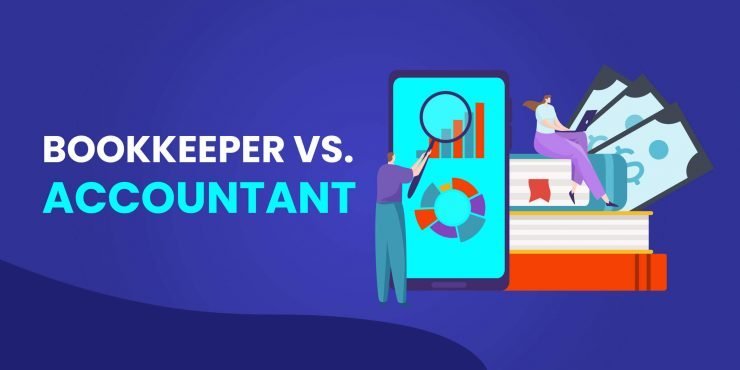Need a bookkeeper? Or an accountant? Wait… what’s the difference?
The main difference between bookkeepers and accountants is that bookkeepers typically only need a high school diploma and perform daily duties like managing financial records, transactions, and payroll while an accountant needs a Bachelor’s degree and is responsible for analyzing financial data and reports to help a business make financial decisions.
Bookkeepers and accountants both handle financial matters but their roles vary significantly when it comes to managing money within businesses or organizations.
I'm a control freak and afraid to trust anyone with my financials. The exception is Colson Strategies who has become a dependable partner. They really know their stuff and are super-friendly.
- Outsourced Bookkeepers, CFOs, and Controllers
- Get expert advice for better financial decisions
- 100% women-owned business
We offer this website completely free to our visitors. To help pay the bills, we’ll often (but not always) set up affiliate relationships with the top providers after selecting our favorites. However, we do our best not to let this impact our choices. There are plenty of high-paying companies we’ve turned down because we didn’t like their product.
An added benefit of our relationships is that we always try to negotiate exclusive discounts for our visitors.
Qualifications and Education Requirements
Bookkeepers and accountants are both essential to the financial industry, but they require different levels of qualifications.
Bookkeepers typically need a high school diploma or equivalent plus experience with financial records while accountants usually need at least a bachelor's degree plus additional training in specific areas related to finance.
Other qualifications for each include:
Bookkeeper Qualifications and Education Requirements


To become a bookkeeper, one must have a high school diploma or equivalent. Some employers may require additional qualifications such as an associate’s degree in accounting or business administration.
Professional certifications like the Certified Bookkeeper (CB) designation from the American Institute of Professional Bookkeepers can also be beneficial to those looking to enter this field.
In addition, bookkeepers should be familiar with basic accounting principles and computer software programs such as Microsoft Excel and QuickBooks.
Accountant Qualifications and Education Requirements


Becoming an accountant requires at least a bachelor's degree in accounting or a related field from an accredited college or university. Many employers prefer applicants with advanced degrees such as master's degrees in accounting or business administration with concentrations in accounting-related topics like taxation and auditing.
Additionally, professional certifications like the Certified Public Accountant (CPA) designation from the American Institute of CPAs can be helpful when seeking employment opportunities within this profession.
The Difference
The primary difference between bookkeepers and accountants is the level of education and type of certification required to obtain each position.
Bookkeepers typically only need a high school diploma or equivalent along with some experience working with financial records and transactions, whereas accountants usually need at least a bachelor's degree plus additional training in specific areas related to finance before they can qualify for positions within this profession.
Furthermore, bookkeeping does not require any type of certification, while becoming certified as an accountant (CPA or CMA) is often necessary if one wishes to work professionally within this field due to its more complex nature compared to basic bookkeeping duties.
Duties
Let’s look at what each of these positions is responsible for.
Bookkeeper Duties


Bookkeepers are responsible for managing financial records and transactions, such as invoices, receipts, payments, payrolls, and other documents.
They must accurately record transactions, reconcile accounts, and prepare reports on the company’s finances. Bookkeepers may also provide advice on taxes and investments.
Examples of bookkeeping duties include maintaining ledgers, reconciling bank statements, processing payrolls, creating invoices, and tracking payments from customers.
Accountant Duties


Accountants have a more advanced role than bookkeepers in that they analyze data to make recommendations about how a business can improve its operations or save money.
Accountants must understand complex accounting principles such as Generally Accepted Accounting Principles (GAAP) and International Financial Reporting Standards (IFRS).
They use this knowledge to create budgets, assess risks associated with certain decisions, develop strategies for growth or cost savings, review contracts for accuracy and compliance with regulations, manage tax preparation processes including filing returns on time, and accurately calculate taxes due each year.
The Difference
The primary difference between an accountant and a bookkeeper is that accountants focus more on analyzing data while bookkeepers focus more on recording it correctly.
Both bookkeepers and accountants are essential for businesses to manage their finances, but the duties of each role differ.
An accountant's job involves making strategic decisions based on their analysis, whereas a bookkeeper's job mainly focuses on day-to-day tasks like entering transactions into the books properly without much interpretation required other than understanding debits/credits etc.
Professional Certifications and Licensing
While bookkeepers may not need any certifications at all, a license is non-negotiable for accountants.
Let’s look at some of the other differences between the two.
Bookkeeper Certifications and Licensing


Bookkeepers are not required to have any specific certifications or licensing in order to practice. However, many employers prefer bookkeepers who hold a certification from the American Institute of Professional Bookkeepers (AIPB).
This certification requires passing an exam that covers topics such as accounting principles, payroll procedures, and tax regulations.
Additionally, some states may require bookkeepers to obtain a business license before they can legally practice.
Accountant Certifications and Licensing


Accountants must meet more stringent requirements than bookkeepers to practice professionally.
Most states require accountants to be licensed by their state board of accountancy before they can offer services publicly.
In addition, most employers also prefer applicants with at least one professional certification from organizations like the American Institute of Certified Public Accountants (AICPA) or the National Association of State Boards of Accountancy (NASBA).
These certifications demonstrate mastery over topics such as auditing standards, taxation laws, financial reporting practices, and ethics codes for professional accountants.
Many employers also prefer accountants who are certified public accountants (CPAs). To become a CPA, one must pass the Uniform Certified Public Accountant Examination administered by the American Institute of Certified Public Accountants (AICPA).
The Difference
The main difference between bookkeeper certifications/licensing and accountant certifications/licensing is that while no specific qualifications are necessary for a person to become a bookkeeper, certain educational requirements must be met for someone to become an accountant.
Furthermore, while both professions may need business licenses depending on where they live, only accountants will need additional licensure from their state board of accountancy to provide services publicly.
Salary
Which makes more? Let’s take a look.
Bookkeeper Salary


The average salary for a bookkeeper is between $30,000 and $50,000 per year.
This amount can vary depending on the type of business they are working in, their experience level, and the location of the job. In addition to base pay, some employers may offer bonuses or other benefits such as health insurance or vacation time.
Accountant Salary


The average salary for an accountant is between $60,000 and $90,000 per year.
Like with bookkeepers, this amount can vary based on experience level and location of the job.
Some employers may also offer additional benefits such as healthcare coverage or retirement plans in addition to base pay.
The Difference
On average, accountants make $60k-$90k annually while the average bookkeeper’s salary is between $30k and $50k.
There is a significant difference in salary expectations between bookkeepers and accountants due to differences in qualifications required for each profession as well as duties performed by each role within an organization.
Bookkeepers typically have fewer education requirements than accountants, resulting in lower salaries overall compared to those earned by accountants who often hold higher degrees such as CPA certification or MBA which command higher salaries than those earned by bookkeepers without these credentials.
I'm a control freak and afraid to trust anyone with my financials. The exception is Colson Strategies who has become a dependable partner. They really know their stuff and are super-friendly.
- Outsourced Bookkeepers, CFOs, and Controllers
- Get expert advice for better financial decisions
- 100% women-owned business
FAQs
Can a bookkeeper be called an accountant?
Yes, a bookkeeper can be called an accountant because the duties they perform are part of the accounting process, but it’s important to remember that a true accountant has to have more qualifications and education.
How is a bookkeeper different from an accountant?
The main difference between a bookkeeper and an accountant is that a bookkeeper records transactions while an accountant provides strategic advice based on their analysis of these transactions.
Do bookkeepers make more than accountants?
No, bookkeepers do not make more than accountants. Accountants tend to earn higher salaries than bookkeepers.
Do you need both a bookkeeper and an accountant?
No, you do not need both a bookkeeper and an accountant. Depending on the size of your business or organization, you may only need one or the other to manage your finances effectively. If you are a small business owner with limited resources, then hiring a bookkeeper might be sufficient to meet your needs. However, if you have complex accounting needs or require tax advice, then it would be beneficial to hire an accountant in addition to a bookkeeper.






















